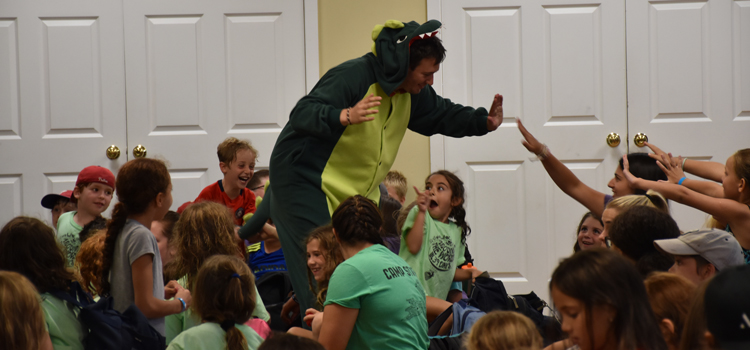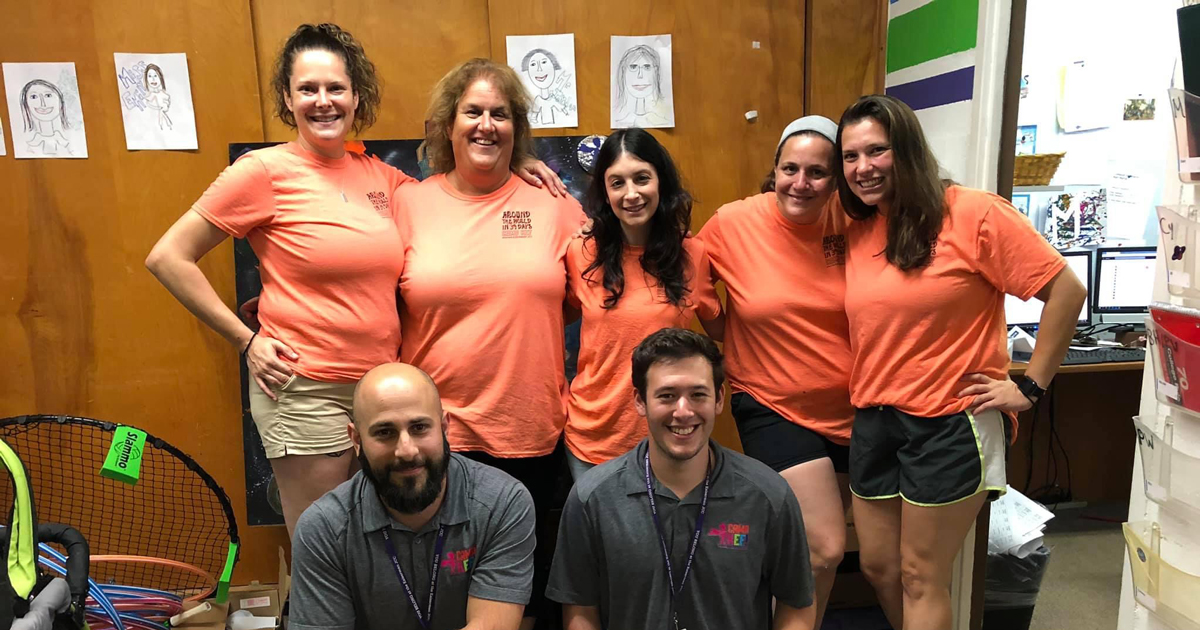When you picture a summer camp director, you often imagine a person with years of experience, but my own career path has taught me that it’s also possible to be a successful young leader at summer camp. Traditionally a camp leader might be someone from the founder’s family, someone who has been a camp director elsewhere, or a parent of a camp family. The expertise that these types of directors can bring to a camp is incredibly useful, but it’s not the only option.
In 2019, I was named Associate Director of Camp Kef without ever setting foot on the grounds. I was excited about the opportunity to be a young leader at summer camp and to provide the day camp experience to hundreds of children. I was also facing a new challenge—overseeing a large staff of almost 100 and preparing them for all of the twists and turns that happen each day at camp. As a 23-year-old, I had to get over the risk of uprooting my life and had to believe that I belonged in the world of day camping. While I didn’t realize it at the time, I used three strategies to navigate that first summer on the Camp Kef leadership team:
- I stepped up in small ways to help build my self-confidence
- I received feedback willingly from those with more experience
- I found opportunities to provide feedback in constructive ways
When you think of career advice, you might assume it’s only relevant to atmospheres like banks, firms, or agencies. It’s important to remember that this professional approach works for camp too. Many summer staff hold different jobs during the year and a newer or younger leader could feel the need to defer to someone who “knows better.” This can lead to self-doubt, or struggles in giving feedback to those with more experience. I went through this myself, which is why I’m sharing this advice. The process of learning to trust my instincts made me a better young leader at summer camp and improved the camp experience for everyone.
Trust that you belong on your summer camp leadership team

The first step to unlocking your full potential as a camp leader is learning to trust yourself, even if you are the youngest or least experienced on your team. During your first year you may not want to rock the boat or be the one to end a tradition that has become routine. In my experience, if these changes are good for the camp, you will gain respect and trust from other employees by doing this work. You can ensure that you are trusting yourself and getting the most out of your camp leadership experience by following these practices:
- Speak up – Just because you may be the new person that doesn’t mean you shouldn’t be heard! If you have an idea, be vocal about it. Challenge yourself to speak up once a day, whether it’s a new idea or even a small observation. As you become more comfortable you will increase how often you speak up.
- Work collaboratively – Asking for your team’s advice or feedback on an idea is a great way to be vocal and also establish trust with your other directors and unit leaders. You will then have a built-in support network and encourage others to share ideas as well.
- Don’t be afraid to overrule respectfully – There’s a reason that you are in the director’s chair and that is to make tough decisions for the good of the camp. While others may not always agree with your changes, you can use examples and outcomes of past success to justify your choice. Make sure you can back up the decision, and do so respectfully so you don’t jeopardize your working relationship.
- Work hard – Set the example for your team that you are not here to have a relaxing boring summer and they will follow suit. Your youth and work ethic may add a jolt of energy that camp is sometimes lacking.
Working hard can catch on at camp—when you have an entire staff buy in to your approach, you can spread that work ethic around camp, and the odds of having a successful summer increase. During my first summer as a director, I decided that I would not ask staff to do anything I wouldn’t do myself. I routinely carried out tasks that were not necessarily part of my job, such as helping out at early care or teaching an activity when a specialist was absent. By working hard and setting a good example, I earned the trust of my staff team despite my age and inexperience working at our specific camp.
The first step to unlocking your full potential as a camp leader is learning to trust yourself, even if you are the youngest or least experienced on your team. During your first year you may not want to rock the boat or be the one to end a tradition that has become routine. In my experience, if these changes are good for the camp, you will gain respect and trust from other employees by doing this work.
Welcome feedback as a way to grow as a young leader at summer camp
It’s a fine line between confidence and cockiness, and I learned that the two don’t have to go hand-in-hand. As I worked to better trust myself, I also made sure to keep in mind that I was then, and still am, a work in progress. Even in my role as director, I learned many lessons from everyone from senior staff to first-time counselors, and of course campers themselves.
Once you master the art of trusting yourself and not letting your age or experience dictate how you act as a director, it is still important to remember that you can learn many lessons. Establishing yourself as a strong director does not mean you know everything, and although it may be intimidating, asking for help will allow you to become a more well-rounded young leader at summer camp. In my experience, these approaches work really well when it comes to requesting and receiving feedback.
- If it’s broken, ask how to fix it – Not every program idea that you implement is going to work at camp. You may have created a new program that didn’t quite work, and instead of thinking, “the staff just doesn’t get it” your mindset should be, “who can I ask for advice?” You could simply be missing something that another staff member will point out that will make your new program a success.
- Change your “glasses” – As a camp director you may be unable to solve a problem that is bringing down camp. Instead of continuing to look at something from a camp director’s lens, ask the elementary school teacher or parent of five kids on staff what their perspective is, and they may solve the problem. Just because you don’t see an answer, doesn’t mean someone else can’t find one.
- It’s not a competition – We are so often groomed to be competitive, but in your role as a camp director you have to focus on your goals, without concern for how you reach them, It’s okay if someone else solves a problem, and you shouldn’t be reluctant to use someone else’s idea due to your pride.
Provide constructive feedback to more experienced staff members
Two things I learned about mistakes in my work as a camp director are that they are inevitable, and that often people may not even realize they’ve made one. It is my job to address these two truths in a respectful way, while staying true to the rules and regulations at camp. Many times these mistakes are made by people you really respect and value, and the idea of giving them constructive feedback is enough to make you not want to come to camp that day. Based on my experience, here are my suggestions for how to approach the challenge of giving constructive feedback to those with more experience.
- Be consistent – If you are going to give feedback to a 16-year-old brand new camper, you better be ready to give the same feedback to the 40-year-old counselor who has been at camp longer than you have been alive. If staff feel that some people have a different set of rules, you will lose all credibility with them.
- Nip it in the bud – You may be nervous to tell that parent of three who teaches soccer at camp that the tone they are using while refereeing a game is not the right fit for your camp. If you avoid having a conversation about it, this behavior will continue and can lead to a larger problem down the line.
- The campers’ experience comes first – When giving constructive feedback to staff members, frame it in a way that explains why the changes you are asking them to make are for the benefit of the children. It is not that they are “wrong,” it’s that campers may have a more positive experience by doing things a different way.
- Believe that you will gain respect – As you dole out feedback, remind yourself that being a fair and consistent director will gain you the respect of your peers and make any future conversations easier.
View your youth as an advantage

Being a young leader at summer camp in a senior role is one of the most rewarding experiences you will ever have. I know this, because it has been for me. It’s also a time of great learning on your path to becoming the person you truly are. We all have experienced ups and downs in this field, and it can be difficult to see beyond those moments.
One that sticks out for me happened when I had only been working for camp for three weeks. I was anxious for my first leadership meeting, where I would work with the directors and division leaders to plan the summer. I wondered if this team, with a combined 60 years of camp experience, would listen to a 23-year-old who had just moved to Philadelphia. I awkwardly introduced myself and otherwise deferred to the director, preferring to be seen and not heard. Since then, I’ve practiced the skills I suggest in this blog post, and have seen my confidence increase.
I’ve learned to create balance between standing up for what I want to see happen at camp, and learning from the experiences of my older colleagues. Camp is about having fun and providing a safe and unforgettable experience for all involved. By striving to grow and learn each day, you are contributing to that and will be creating lifelong memories for everyone.
Matt Martin is the Associate Director of Camp Kef at the Kaiserman Jewish Community Center. He spent his first two summers out of college as a program coordinator at Camp Deeny Riback in Flander, New Jersey before moving down to the Philadelphia area. Matt is a lover of New York Sports, specifically the Mets and Jets. He is a self professed Star Wars nerd and enjoys spending time hiking through nature trails.
